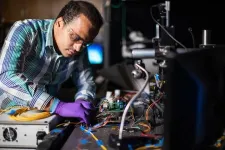(Press-News.org) CHAPEL HILL, North Carolina--A new study has demonstrated that patients with advanced bladder cancers whose tumors have a mutated FGFR3 gene respond to immunotherapy treatment in a manner that is similar to patients without that mutation, a discovery that runs counter to previous assumptions. This research, led by scientists at the University of North Carolina Lineberger Comprehensive Cancer Center, has important implications for patients who have not been offered immunotherapy because of their genetic profiles.
The findings are published in the British Journal of Cancer.
The National Cancer Institute estimates that 83,730 people in the United States will be diagnosed with bladder cancer in 2021, and the disease will cause 17,200 deaths. While the cancer is treatable when diagnosed early, the five-year survival rate is approximately 6 percent in advanced cases where the cancer has spread to other parts of the body. Within that low survival group of patients, about 15 percent of their tumors have mutations in the FGFR3 gene, making the gene overactive and contributing to high mortality for the disease.
"Despite prior work suggesting that FGFR3-mutated bladder cancers should not be treated with immunotherapy, our study demonstrates the opposite, so we believe that immunotherapy should be offered without hesitation," said UNC Lineberger's William Y. Kim, MD, Rush S. Dickson Distinguished Professor of Medicine and professor of Genetics and the paper's corresponding author.
There have been several recent significant treatment advances for bladder cancer. In 2019, the FDA approved a drug, erdafitinib (Balversa), that targets FGFR3 and prolongs survival. Additionally, immune checkpoint blockade drugs, commonly known as immunotherapies, have recently been approved for advanced bladder cancer. Prior to this decade, treatment was primarily limited to systemic, platinum-based chemotherapy.
"Clinical trials have shown that bladder cancers with FGFR3 mutations have fewer immune cells, primarily T cells, than cancers without the mutation. Because tumors with low levels of immune cells tend to respond poorly to immune checkpoint blockades, it has been hypothesized that those patients would have low response rates to immunotherapy," said UNC Lineberger's Tracy Rose, MD, MPH, assistant professor at the UNC School of Medicine and the paper's co-first author.
To test the hypothesis, UNC Lineberger researchers designed a study to compare tumor tissue samples and clinical trials data from 17 patients with FGFR3-mutated bladder cancer to 86 patients whose tumors did not have the mutation. The investigators found that patients with FGFR3 mutations responded to immunotherapy equally as well as those without the mutations. At a cellular level, they also found equivalent diversities of T cell receptors and a similar balance of immune suppression and immune activation signals in tumors with and without FGFR3 mutations. This equivalency, or balance, indicates a similar chance of benefiting from immunotherapy.
"The standard of care for advanced bladder cancer is getting pretty complicated, but having more options is a good thing," Kim said. "Today, most patients will get chemotherapy and then, if needed, FGFR3-altered tumors can be treated with either erdafitinib or immunotherapy."
The researchers hope to establish a clinical trial to test whether patients with FGFR3 alterations benefit more from erdafitinib or immunotherapy.
"Our study does not rule out the possibility that erdafitinib will synergize with immunotherapy," said William Weir, co-first author and an MD-PhD student at UNC-Chapel Hill. "If anything, the fact that FGFR3-altered patients benefit from immunotherapy argues that this may be a reasonable approach."
INFORMATION:
Authors and disclosures
In addition to Kim, Rose and Weir, the paper's other authors at UNC include Mi Zhou, PhD, Matthew Nielsen, MD, Angela B. Smith, MD, Michele C. Hayward, RD, Ashley H. Salazar, Matthew I. Milowsky, MD, Sara E. Wobker, MD, MPH, and Katrina McGinty, MD; Patrick Eulitt, MD, formerly of UNC and now with Rocky Mountain Cancer Centers; Joshua M. Uronis, PhD, Gregory M. Mayhew, DrPH, Yoichiro Shibata, PhD, Michael V. Millburn, PhD, and Joel R. Eisner, PhD, at GeneCentric Therapeutics, Inc., Durham, NC; and Michael Woods, MD, Department of Urology, Loyola University, Melrose Park, IL.
This work was supported by a research collaboration agreement between Janssen Research & Development, LLC and GeneCentric Therapeutics, Inc. and a sponsored research agreement between GeneCentric and the University of North Carolina at Chapel Hill.
Kim and Rose receive research funding from GeneCentric Therapeutics and Merck. Rose receives research funding from Genentech/Hoffman-La Roche and Bristol-Myers Squibb. The GeneCentric Therapeutics authors have stock interests in the company. Mayhew is a patent holder of the GeneCentric bladder cancer subtype classifier.
ROCHESTER, Minn. -- A new study by Fergus Couch, Ph.D., of Mayo Clinic Cancer Center, along with collaborators from the CARRIERS consortium, suggests that most women with breast cancer diagnosed over 65 should be offered hereditary cancer genetic testing. The study was published Thursday, July 22, in the Journal of Clinical Oncology.
Dr. Couch says that women over 65 rarely qualify for hereditary cancer genetic testing based on current testing guidelines because they are thought to exhibit low rates of genetic mutations in breast cancer genes.
"Most studies of breast cancer genes have not looked at older women, those who were diagnosed over the age of 65," says Dr. Couch. He says these studies have mainly tested women with a strong family history of breast ...
- Data show dose-responsive, non-saturated increases in gastrointestinal consumption of Phe in humans by SYNB1618 -
- SYNB1618 Phase 2 study in patients with PKU ongoing with proof-of-concept readout anticipated in 2H 2021 -
- Phase 1 study of SYNB1934, an evolved strain of SYNB1618 in the PKU portfolio, initiated -
CAMBRIDGE, Mass., July 22, 2021 /PRNewswire/ -- Synlogic, Inc. (Nasdaq: SYBX), a clinical stage company bringing the transformative potential of synthetic biology to medicine, announced today the publication of two papers in the journals Nature Metabolism and Communications Biology. The publications detail findings ...
Millennials, often referred to as the "job-hopping generation," represent a group of young workers who once grabbed the national spotlight with their publicized demands for "fun" work perks, such as happy hours. However, researchers at the Novak Leadership Institute at the University of Missouri and Kansas State University discovered today's young workers -- ages 21-34 -- represent a life-stage shift toward placing more value on having respectful communication in the workplace over trendy work perks.
"Millennials have been called the 'entitled generation,' and they kind of give young workers a bad rap because their often-publicized interests ...
Having friends may not only be good for the health of your social life, but also for your actual health--if you're a hyena, that is. Strong social connections and greater maternal care early in life can influence molecular markers related to gene expression in DNA and future stress response, suggests a new University of Colorado Boulder study of spotted hyenas in the wild.
Researchers found that more social connection and maternal care during a hyena's cub and subadult, or "teenage," years corresponded with lower adult stress hormone levels and fewer modifications to DNA, including near genes involved in immune function, inflammation and ...
The body's so-called good cholesterol may be even better than we realize. New research from Washington University School of Medicine in St. Louis suggests that one type of high-density lipoprotein (HDL) has a previously unknown role in protecting the liver from injury. This HDL protects the liver by blocking inflammatory signals produced by common gut bacteria.
The study is published July 23 in the journal Science.
HDL is mostly known for mopping up cholesterol in the body and delivering it to the liver for disposal. But in the new study, the researchers identified a special type of HDL called HDL3 that, when produced by the intestine, blocks gut bacterial signals ...
By analyzing peoples' visitation patterns to essential establishments like pharmacies, religious centers and grocery stores during Hurricane Harvey, researchers at Texas A&M University have developed a framework to assess the recovery of communities after natural disasters in near real time. They said the information gleaned from their analysis would help federal agencies allocate resources equitably among communities ailing from a disaster.
"Neighboring communities can be impacted very differently after a natural catastrophic event," said Dr. Ali Mostafavi, associate professor in the ...
Most people can expect to break close to two bones in their lifetime, but those with osteogenesis imperfecta -- also known as brittle bone disease -- can break hundreds of bones before they even hit puberty. And while healthy bones can break from a hard fall or a bad car wreck, there may not be an apparent reason at all with brittle bone disease.
Classified as a rare disease, osteogenesis imperfecta, or OI, affects 6-7 people out of every 100,000 live births and can range in severity depending on the specific mutation. And while there are currently few treatment options and no cure, ...
DURHAM, N.C. - Scientists at Duke University have developed a suite of four new tests that can be used to detect coal ash contamination in soil with unprecedented sensitivity.
The tests are specifically designed to analyze soil for the presence of fly ash particles so small other tests might miss them.
Fly ash is part of coal combustion residuals (CCRs) that are generated when a power plant burns pulverized coal. The tiny fly ash particles, which are often microscopic in size, contain high concentrations of arsenic, selenium and other toxic elements, many of which have been ...
According to the United Nations' telecommunications agency, 93% of the global population has access to a mobile-broadband network of some kind. With data becoming more readily available to consumers, there is also an appetite for more of it, and at faster speeds.
Ramy Rady, doctoral student in the Department of Electrical and Computer Engineering at Texas A&M University, is working with Dr. Kamran Entesari, his faculty advisor and professor, and Dr. Christi Madsen, professor, to design a chip that can revolutionize the current data rate for processors and technologies such as smartphones, laptops, etc. Dr. Sam Palermo, ...
Since early 2019, researchers have been recording and analysing marsquakes as part of the InSight mission. This relies on a seismometer whose data acquisition and control electronics were developed at ETH Zurich. Using this data, the researchers have now measured the red planet's crust, mantle and core - data that will help determine the formation and evolution of Mars and, by extension, the entire solar system.
Mars once completely molten
We know that Earth is made up of shells: a thin crust of light, solid rock surrounds a thick mantle of heavy, viscous rock, which in turn envelopes a core consisting mainly of iron and ...





